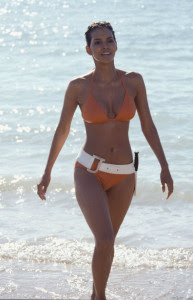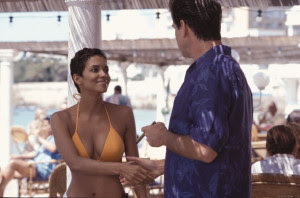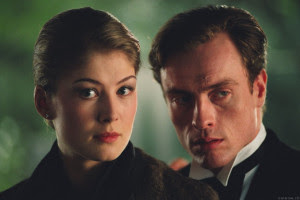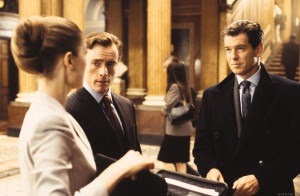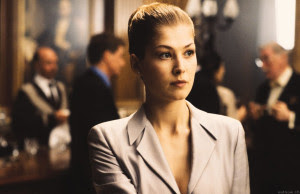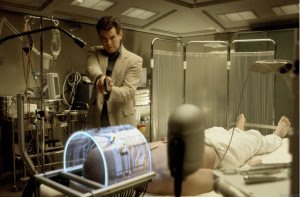
"THE DEMAND FOR AN IDEAL WOMAN"
Over seven months ago, the STAR WARS movie, "STAR WARS: EPISODE I - THE PHANTOM MENACE" had achieved a milestone. Twenty years has passed since it initial release in theaters in May 1999. However, there have been other recent or upcoming events within the STAR WARS franchise. One of them was the release of the third Sequel Trilogy movie in December 2019, "STAR WARS: EPISODE IX - THE RISE OF SKYWALKER" and the release of the Disney Plus series, "THE MANDALORIAN". And last year, a Young Adults (YA) novel called "Queen's Shadow", hit the bookstores. It was the first stand alone story about the Prequel Trilogy's leading lady, Padmé Amidala.
Many fans, especially women, celebrated the release of "Queen's Shadow". Written by EK Johnston, the novel focused on a period in Padmé's life, when her career underwent a transformation from the elected monarch of Naboo to a senator of Naboo. This meant that the novel was set sometime during those ten years between "THE PHANTOM MENACE" and "STAR WARS: EPISODE II - ATTACK OF THE CLONES". More importantly, this novel featured the first time that Padmé was the main protagonist in any STAR WARS movie, television production or novel. "Queen's Shadow" also led many fans to contemplate the idea of Padmé surviving the birth of her twin children, Luke and Leia, and becoming a leader for the early manifestation of the Rebel Alliance. More importantly, the novel and the 20th anniversary of "THE PHANTOM MENACE" has revived the fans' never ending complaint that filmmaker George Lucas should have portrayed Padmé as an ideal character . . . a feminist icon.
As a woman, the idea of a leading woman character as a feminist icon sounds very appealing. But as a lover of films and novels, I tend to harbor a strong wariness toward such characters - regardless of their gender. Recently, some fans have suggested that Padmé should have been the main character of the Prequel Trilogy (1999-2005) and not her husband, Anakin Skywalker. Considering that Anakin eventually became Darth Vader from the Original Trilogy (1977-1983), I found this suggestion a little hard to swallow. Even worse, I find the constant complaints that Lucas had "ruined" Padmé's character, due to the manner of her death in "STAR WARS: EPISODE III - REVENGE OF THE SITH", rather tiresome and pedantic. As I have pointed out in a previous article about Padmé, I found nothing wrong with a person succumbing to death due to a "broken heart" or allowing one's emotions to affect his/her health. Such deaths have actually occurred in real life. And considering that Padmé was in the third trimester of her pregnancy, had endured a series of traumatic events in her professional and personal life, including a recent attack by a jealous Anakin, the circumstances of her death did not surprise me, let alone anger me.
In regard to the idea that Padmé Amidala should have been the main protagonist of the Prequel Trilogy . . . this did not make any sense to me. Like Han Solo and Leia Organa in the Original Trilogy, Padmé was a major supporting character in the Prequel Trilogy. The real focus of the Prequel Trilogy was Anakin Skywalker, which made sense considering he proved to be the catalyst of the Jedi Order's downfall and rise of the Galactic Empire. And in his own way, Padmé and Anakin's son, Luke Skywalker, was the Original Trilogy's main character. Although Ewan McGregor was the leading actor in the second and third films of the Prequel Trilogy, Obi-Wan Kenobi was not the central character. It was still Anakin. And I do not recall any film in STAR WARS franchise being made solely about Obi-Wan. Oh yes, there are now plans for one, but due to the failure of "SOLO: A STAR WARS STORY" during the summer of 2018, Disney Studios had originally decided to curtail any Obi-Wan solo film. Yet, many did not complain at the time.
Many fans had bitched and moaned about how Lucas treated Padmé's character, because he had conveyed her weaknesses, as well as her strengths. He did the same with many male characters. Apparently, certain people cannot deal with a major female character's weaknesses being on display, unless she is either the main character or in a drama. What am I saying? Many people still cannot make up their mines on whether they want the Rey character from Disney's Sequel Trilogy to be ideal or flawed. On the other hand, I once came across an article - it might have come from "The Mary Sue Blog" but I am not sure - claimed that the problem with Padmé was not that she was not allowed to have flaws. This person claimed that the that moviegoers saw her as a problem solver who never gave up in the first two movies. The article also added that Padmé was not someone who would give up the will to live. A few years ago, I had written an ARTICLE that discussed Padmé's mistakes in all three Prequel Trilogy movies and argued that she was not the "flawless" or "ideal" character that many still regard her as.
I had also pointed out that in "STAR WARS: EPISODE III – REVENGE OF THE SITH", Padmé had experienced the loss of the Galactic Republic, the rise of the Galactic Empire, the loss of her husband to Palpatine and the Sith, and his physical attack on her in a brief space of time – within two days or less. As someone who had recently experienced personal loss, I understood why she had given in to emotional despair. I had only experienced one loss. Padmé did not. Just because she was able to not give up and overcome a situation in the past, did not mean that she would always be able to do this.
I still recall the "BUFFY THE VAMPIRE SLAYER" Season Five episode called (5.21) "The Weight of the World" in which the main protagonist, Buffy Summers, had went into a catatonic state after she failing to prevent her younger sister Dawn from being abducted by the season’s Big Bad, a hell demon called Glory. Buffy had failed to overcome her state of catatonic depression on her own. She needed help and she eventually got it in the form of one of her closest friends, Willow Rosenberg. There was no Willow to help Padmé deal with her emotional state during the downfall of the Republic and the Jedi Order. Padmé had no Willow to deal with the emotional trauma of Anakin's transformation into a Sith Lord or his attack upon her. Instead, she had to deal with going into premature labor and giving birth to twins. I hate to say this, but neither Obi-Wan Kenobi, Yoda or Bail Organa were as emotionally close to Padmé as Willow Rosenberg was close to Buffy Summers. And instead of providing emotional support to her, the two Jedi Masters and the senator were more focused on her going into labor and giving birth.
There is something about today's feminism that truly irritates me. Women (both in real life and in fiction) are not allowed to be flawed. Actually, I think today's feminists and sexist men have that trait in common. Both groups demand that women be ideal in a way THEY believe women should be ideal. For feminists, women should be some all knowing saint, who can kick ass and have a successful career outside of the home. For sexist men (or men in general), women should be attractive or beautiful bed warmers, home carers and emotional crutches. Women are expected to revolve their lives around the men in their lives. Women in real life are not allowed to be flawed - especially if they are famous. And fictional women - especially those who are major characters in an action story - are definitely NOT ALLOWED to be flawed. Especially someone like Padmé Amidala.
I do not believe that Lucas had subjected Padmé's character with weak writing. I think too many fans were too prejudiced to allow her to be a complex woman with both strengths and weaknesses. They had wanted . . . no, they had demanded she be some feminist icon. While complaining about Padmé's character, they would always compare her with her daughter, Princess Leia Organa aka Skywalker. The ironic thing is that Leia was no more of a feminist icon than her mother. Leia had her own set of flaws. Yes, she was an intelligent and capable political leader, who was also knowledgeable about military tactics and defending herself. Leia also possessed a tough demeanor and a sharp wit. On the other hand, Leia also harbored a hot temper, impatience and a penchant for being both judgmental and an emotional coward. Nor was she the type to be forgiving (except with certain people). Two of Leia's flaws - her temper and being judgmental - were on full display in the 1980 movie, "STAR WARS: EPISODE V - THE EMPIRE STRIKES BACK". In that film, she had supported Chewbacca’s angry and murderous attack upon Lando Calrissian, after the latter was forced to betray them to Darth Vader and the Empire. During that scene, both Leia and Chewbacca’s anger got the best of them at a time when it should not have. Neither had pondered over how the Empire had arrived on Bespin before them. Nor did they ever considered that Vader had coerced Lando into choosing between betraying Han and them or watching the Empire destroy Bespin and its citizens.
Many fans have also complained that George Lucas had failed to explore Padmé's backstory . . . especially in "THE PHANTOM MENACE" and "ATTACK OF THE CLONES". I found this complaint rather hypocritical. Lucas had never bothered to explore Leia or her future husband Han Solo's backstory in the Original Trilogy films. Yet, no one or very few people have complained about this. When Disney Studios finally green-lighted a movie about Han's backstory, many film goers and media outlets like "The Mary Sue Blog" bitched and moaned about how it was not necessary. I suspect they had made this complaint, because it was easier than criticizing how Disney Studios/Lucasfilm had handled the movie's production and theatrical release. Is it any wonder that I found this complaint that a movie about Han's backstory was not necessary, but Padmé's was? And to this day, no one has complained about a lack of Leia's backstory in the 1977-1983 films.
What I find even more ironic is that these same fans have complained that the Rey character from the Sequel Trilogy, produced and released by a Disney Studios controlled Lucasfilm was a Mary Sue. They found her character one-dimensional, a bit too ideal and her skills in the Force too implausible to believe. Mind you, I agree with them. But I do find it ironic that they erroneously celebrate Leia for being ideal, complain about Padmé's less than ideal characterization . . . and complain that someone like Rey is too ideal. Ah, the fickleness of human nature.
Look, I am happy that a novel about Padmé Amidala has been written. And I find it interesting that STAR WARS fans will get a chance to peek into those years between "THE PHANTOM MENACE" and "ATTACK OF THE CLONES". But I must admit that I found myself getting irritated that so many have used the novel's upcoming release to criticize George Lucas' portrayal of her character. It seems obvious to me that a great deal of their criticism is wrapped around a lot of hypocrisy, an inability to understand human nature and a definite lack of attention toward what actually happened to Padmé in the Prequel Trilogy. I cannot help but feel that some people need to realize that in contemplating feminism, they also need to factor in the concept of human nature . . . and good writing. Good writing or a strong character is not one who can do no wrong or be strong, 24/7. A strong character, for me, is someone who possesses both strengths and weaknesses . . . or virtues and flaws. As far as I am concerned, George Lucas had included all in his creation of Padmé Amidala.


